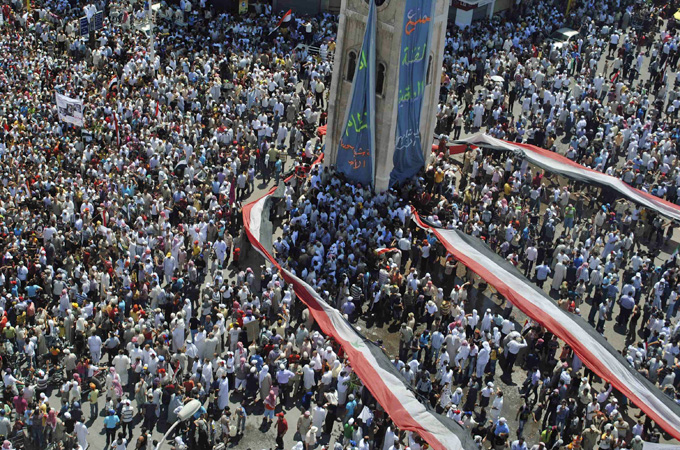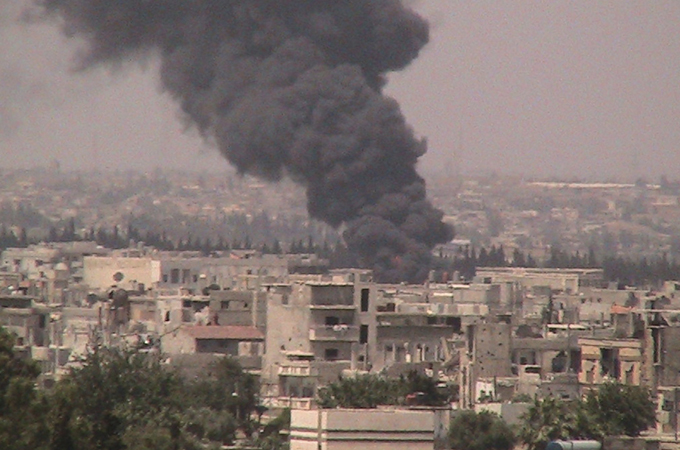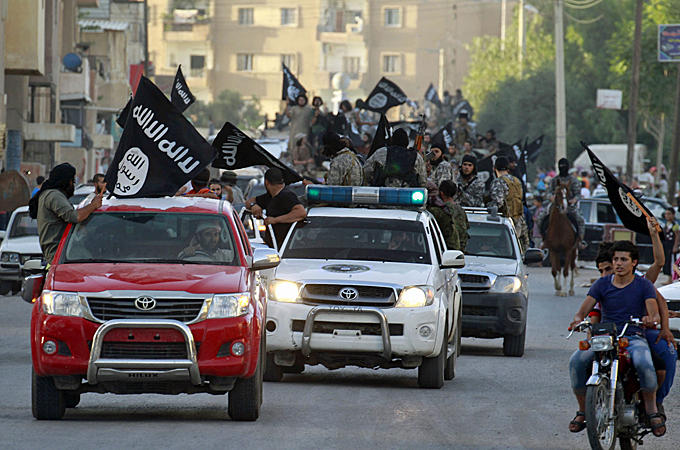Timeline of Syria’s raging war
Key events in conflict that so far claimed the lives of more than 150,000 people and displaced half the population.

The Syrian conflict has been growing in intensity and scope for more than three years. An estimated 150,000 people have died since the uprising began in March 2011.
More than two million people have left the country, fleeing fighting between government forces and opposition fighters.
Keep reading
list of 4 itemsUK has begun mass arrests of potential Rwanda deportees: What’s next?
World Press Freedom Day: Gaza conflict deadliest for journalists
Israeli firms sold invasive surveillance tech to Indonesia: Report
Here are some of the key events in the conflict:
2011: Protests, crackdown and condemnation
March: Protests are held in different parts of the country, inspired by other popular uprisings across the Arab world. The military cracks down on protesters in Damascus, Banias and Deraa, cradle of the uprising where 100 people are reportedly killed on the 23rd.
April: President Bashar al-Assad vows to crush what he called “terrorists”. Protests calling for the downfall of the regime spread and strengthen. The crackdown intensifies. Hundreds are killed.
 |
| Syrians in their thousands took to the streets nationwide for the to demand an end to Assad’s rule [Reuters] |
May: The US imposes sanctions on Assad and senior Syrian officials for human rights abuses.
June: Details emerge of a mutiny by Syrian soldiers in the northern town of Jisr al-Shughour, where 120 troops were killed, according to the government.
August: After days of ferocious assault on the city of Hama, the epicenter of anti-regime protests, hundreds are left dead by Syrian security forces backed by tanks and snipers. The US, Britain, France and Germany and the European Union demand that Assad resign, saying he is unfit to lead.
The Syrian National Council is formed, the first opposition coalition of diverse groups seeking an end to Assad’s rule. The body a year later becomes part of a supposedly more encompassing Syrian National Coalition.
October: Russia and China veto a European-backed UN Security Council resolution that threatens sanctions against Syria if it doesn’t immediately halt its military crackdown against civilians.US pulls its ambassador out of Syria. The Arab League votes to suspend Syria’s membership.
November: The Arab League overwhelmingly approves sanctions against Syria to pressure Damascus to end the crackdown, an unprecedented move against an Arab state.
December: Back-to-back car bombs near Syria’s intelligence agencies in Damascus kill at least 44 in the first major attack in the heart of the capital. Syria’s state-run TV blames al-Qaeda fighters.
Syrian security forces open fire on thousands of anti-government protesters in the central city of Hama, one day ahead of a visit by Arab League observers on a mission to end the crackdown.
2012: Massacres as international diplomacy fails
January: The Arab League halts its observer mission in Syria because of escalating violence.
Jabhat al-Nusra, al-Qaeda’s branch in Syria, announces its creation. Since then it has been described as “one of the most effective rebel forces” in Syria. The group has been designated as a terrorist organisation by the UN, US, UK, Australia and Turkey.
February:Russia and China veto a resolution in the UN Security Council that backs an Arab League plan calling for Assad to step down. The diplomatic development came a day after hundreds of casualties were reported in a major assault by government forces on Homs’ Khalidiyah district.
 |
| After months of fierce military assaults and rebel ambushes in Homs, Assad troops regain control of the central city [Reuters] |
Syria holds referendum on a new constitution, a gesture by Assad to placate the opposition. The West dismisses the vote as a sham.
March: Syrian troops take control of shattered Bab Amr in Homs after a government assault that raged for weeks. The main opposition group, the Syrian National Council, forms a military council to organise and unify all armed resistance.
April: Syria promises to comply with a UN-brokered ceasefire but carves out an important condition – that the regime still has a right to defend itself against terrorists that it says are behind the uprising. The agreement ultimately fails to hold.
May: A massacre in Houla village in Homs leave more than 100 killed, nearly half of them children. The UN Human Rights Council later releases a report accusing Assad’s forces and pro-government militiamen of war crimes during the bloodbath.
June: UN observers suspend patrols in Syria due to escalating violence.
July: A blast at the National Security building in Damascus kills the defence minister and his deputy, who is also Assad’s brother-in-law, and wounds the interior minister. Rebels claim responsibility.
July: Syria threatens to unleash chemical and biological weapons if the country faces a foreign attack, the country’s first acknowledgement that it possesses weapons of mass destruction.
August: Kofi Annan announces his resignation as UN-Arab League envoy to Syria after failing to broker a ceasefire.
Obama says US will reconsider its opposition to military involvement in Syria if Assad’s regime deploys or uses chemical or biological weapons, calling such action a “red line” for the US.
November: Syrian anti-government groups strike a deal to form the Syrian National Coalition, a new opposition leadership that will include representatives from the country’s disparate factions fighting to topple Assad’s regime, responding to repeated calls from their Western and Arab supporters to create a cohesive and representative leadership.
2013: Chemical attack and rebel infighting
January: A defiant Assad blames “murderous criminals” for violence in Syria, ignores international demands to step down and pledges to continue the battle “as long as there is one terrorist left” in Syria.
April:The leader of the self-declared Jihadist group the Islamic State of Iraq, Abu Bakr al-Baghdadi, released a recorded audio message, in which he announces that Jabhat al-Nusra was an extension of al-Qaeda in Iraq and Syria. The leader of al-Nusra, Abu Mohammad al-Joulani, refuses the merger. Divisions and infighting among the ranks of the self-labelled jihadists emerge.
 |
| Syrian activists accused Assad’s forces of launching a chemical attack that killed hundreds of people[Reuters] |
May: The European Union ends its embargo on sending weapons to help Syrian rebels.
June: Obama authorises sending weapons to Syrian rebels after White House discloses that US has conclusive evidence Assad’s government used chemical weapons on a small scale against opposition forces.
August: The Assad regime is accused of using chemical weapons in the Damascus suburbs to kill hundreds of civilians, including many children as they slept. The government denies using chemical weapons.
Obama says he has decided the United States should take military action against Syria. But the president says he will seek congressional authorisation for the use of force.
September: A possible diplomatic solution to avoid a US military strike arose when Syria welcomed a suggestion to move all of the country’s chemical weapons under international control. UN Security Council unanimously adopts a resolution requiring the Syrian regime to dismantle its chemical weapons arsenal.
October: Officials from OPCW arrive in Damascus to monitor the dismantling of Syria’s chemical weapons arsenal.
2014: Failed peace attempts and presidential election
January: UN Secretary-General Ban Ki-moon convenes the first round of peace talks in Geneva involving the Syrian government and Syrian National Coalition.
February:A second round of the Geneva talks is held; representatives of governm
 |
| Islamic State group fighters held a parade to celebrate their declaration of a “caliphate” in parts of Iraq and Syria[Reuters] |
ent and opposition fail to agree on agenda; Joint Special Envoy Lakhdar Brahimi apologises to the Syrian people for lack of progress in the talks. He resigns in May.
June: Syria holds a presidential election in government-held areas. More than one person could stand as a presidential candidate for the first time since the Assad family came to power more four decades ago.
The establishment of a new “caliphate” was announced by the Islamic State of Iraq and the Levant, with Abu Bakr al-Baghdadi named as caliph. The group formally changed its name to “Islamic State”.
July: The UN Security Council unanimously approved a resolution on Syria allowing aid convoys to go into rebel-held areas without government approval.